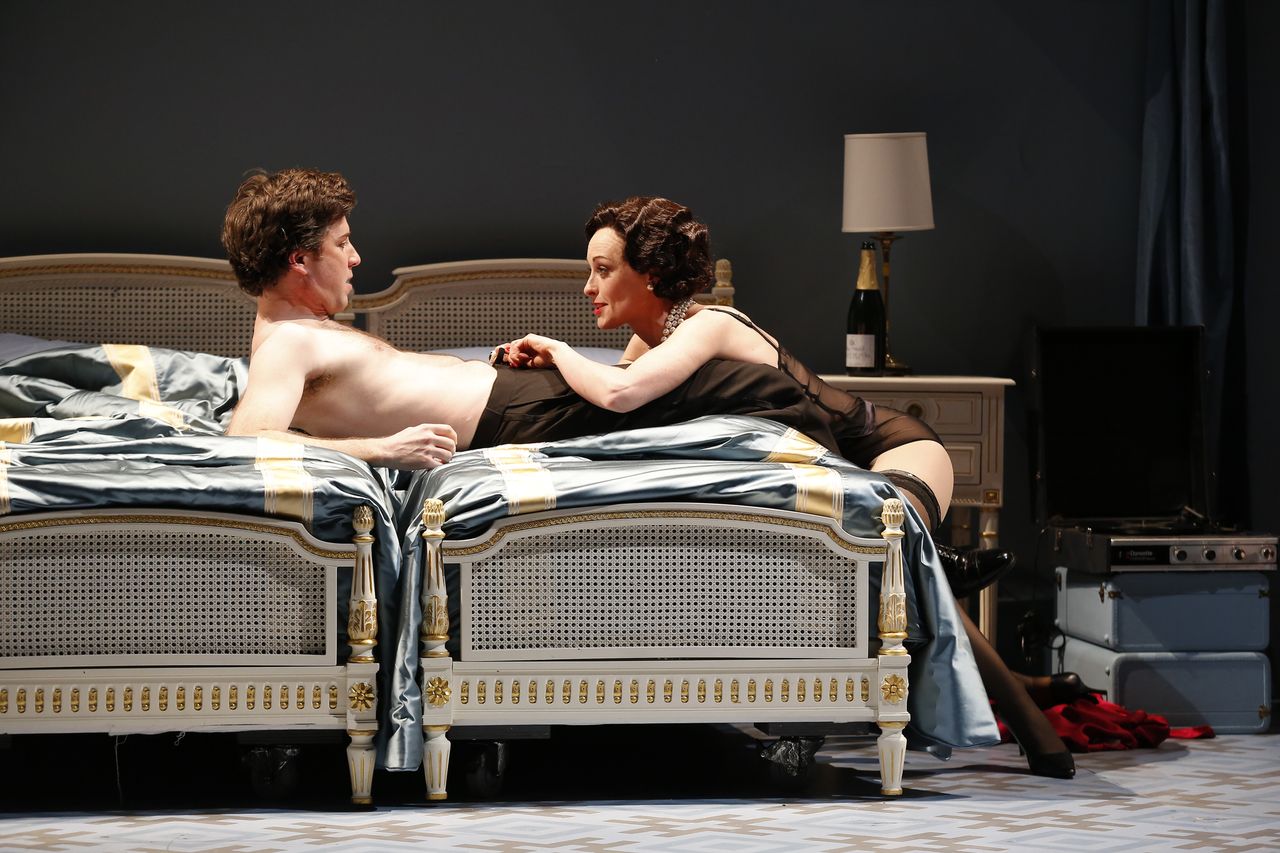New York City Opera goes down and gets dirty with “Powder Her Face”

Allison Cook and William Ferguson in Thomas Adès’s “Powder Her Face” at New York City Opera. Photo: Carol Rosegg
The earliest operas were high-minded affairs, drawn from classical texts and shaped by learned debates about art—at least according to standard histories of music. But when opera moved from palaces and academies to public theatres, its themes and tone shifted. In Venice, opera became a pre-Lenten diversion, steeped in what one chronicle calls “the excess, pageantry, and bad behavior that carnival celebrates.”
The first offering in New York City Opera’s spring season, Thomas Adès’s Powder Her Face (1995), has minimal pageantry, but it does offer excess and bad behavior aplenty. Its eight scenes and “ghost epilogue” are based on the life of Margaret, Duchess of Argyll, the so-called “dirty duchess,” whose sensational divorce trial, complete with explicit Polaroids and allegations of depraved sexual exploits, riveted post-war Britain. Powder is a carnivalesque romp in other respects: in the promiscuous mix of its music, which darts between “high” and “low” styles (tangos, a thirties-style popular song, urbane allusions to Strauss and Stravinsky); and in its plot, which shows eros, like masked revels, as a mighty social leveler.
Jay Scheib’s wickedly smart NYCO staging is not for prudes. At one point, Her Grace’s robin’s-egg hotel room swarms with some two dozen young men in the altogether, and hardly a minute goes by without couplings of some variety getting under way. What’s more, a camera operator (Chelsey Blackmon) shoots much of the action, including drug use and earthier activities in a mirrored loo, which the audience sees simultaneously in the flesh, as it were, and as large-scale video projections.
The conceit encapsulates some of the key concerns in Philip Hensher’s libretto: the blurring of lines between “public” and “private” in a media-saturated world, and the kneejerk voyeurism fostered in such a society. In the duchess’s room, her naked friends gather around a television set to leer at a copulating duo much as we in the audience ogle them. Do proliferating images reflect or cause the indiscriminate hunger that drives the duchess and Powder’s other sex-crazed characters? And are we, eager viewers and consumers, not every bit as flawed as they?
Allison Cook as the duchess leads NYCO’s strong cast. All angular allure, she seems born to the mid-century chic of Alba Clemente’s superb costumes, and she ably captures her character’s many contradictions: her elegance and pathetic craving for attention; her fetid loathing of the “Blacks” and “Jews” on the rise in society and seething awareness of the double standards that apply to her. (Her husband is no less randy than she, and the divorce-court judge who condemns her does so while being fellated under the bench.) Cook’s voice, like the duchess herself, is not pretty, but it is grand, raw with need at opera’s end when, like Alban Berg’s Lulu with Jack the Ripper, she attempts to service the hotel manager who has come to evict her.
Opera’s most celebrated singers of womanly desire are Mozart and Richard Strauss, and whiffs of their music (for Despina, Zerbinetta, and others) swirl around Adès’s scoring for the duchess’s maid, who also appears as a society journalist, the duke’s mistress, and other characters. Nili Riemer is a kewpie-doll dynamo on stage, whether jumping on beds or taking more pratfalls than a circus clown. Her sound is bright and pungent, and she dispatches Adès’s spiky, chirping, and sometimes cruelly high writing with seemingly boundless energy and panache.
As the electrician, William Ferguson in an early scene puts on duchess drag with delectable cruelty; and as the lounge lizard who sings a romantic ballad inspired by the duchess (“Stretch me out… / You’re my ideal: / so see you tonight”), he croons with bewitching and vacuous charm. Matt Boehler as the hotel manager and other icons of gravitas (the judge, the duke) shines as he serves up Adès’s yawning intervals and multi-octave slides and his characters’ sputtering platitudes. Stylish sets by Marsha Ginsberg, lighting by Thomas Dunn, and projections by Josh Higgason round out NYCO’s impressive production.
In the pit, Jonathan Stockhammer leads a throbbing, neon-bright reading of Adès’s score: the final moments of the opera bring an achingly gorgeous clarinet solo, and the return of the accordion’s tang and restless brass eruptions from Powder’s opening measures suggest a cycle of unquenchable desire. A few months ago the Metropolitan Opera presented Adès’s The Tempest (2004), and the composer’s stylistic tics—incessant glissandi, instrumental swoons, vocalists singing at the upper and lower extremes of their range—do wear thin on repeated hearings. But NYCO’s Powder Her Face is a giddy and sharp-witted vision of a carnivalesque opera for our post-modern times.
Powder Her Face plays February 21 and 23 at at the Brooklyn Academy of Music’s Howard Gilman Opera www.nycopera.com, www.bam.org, or 718-636-4100.